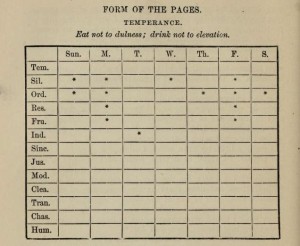I think that the hardest part of taking a poetry workshop after just finishing one is the tendency to hold onto the attention to sound. Last semester’s key or cornerstone was sound: how it paces poems, the way different groupings of sounds can make a line or stanza feel different emotively, etc. I used a lot of music as inspiration this semester, and I relied on my ears and my mouth to help me shape poems based on the way they sounded. My poems began to form themselves around sounds, rather than around some narrative or overarching theme. I would often give up the “right” word to place a more sonically pleasing word in its place, and I grew less and less focused on content. My poems were more interested in assonance, consonance, and interweaving the re-occurrence of sounds to form a dissonance or harmony that I could fit to my purpose. The hardest part is switching gears and giving form a place in my poetry.
In my Humanities class, we read Benjamin Franklin’s autobiography, and he had a method for improving himself that involved making a kind of calendar and marking each week down in favor of a different virtue he deemed important, and noting the days he was violating these virtues.
(https://cdn1.vox-cdn.com/thumbor/TtkENRR7r5YihNNHBfHKfuJAclA=/cdn0.vox-cdn.com/uploads/chorus_asset/file/3477870/franklinschart.0.jpg)
While I don’t think this is a habit I’ll begin taking up, I do think that I’ll take a page from his book and try to alternate between different aspects of my poetry; maybe spend a week thinking about sound, and once I feel I’ve given sound its due, moving on to form and content or narrative. I don’t want to ignore the progress I’ve made with regard to sound, and I do want to think more about form and its importance in conveying my message, so maybe I can keep practicing with both.
Does anyone else have a hard time choosing an aspect of their poetry to focus on, to value above others, when the poem itself demands attention to all aspects of its creation? Or do we naturally tend toward one aspect, as poets, some gravitating to one and others to another?


At the risk of being maddeningly brief: isn’t sound a form itself, though? You might like to track down Karen Volkman’s writing; more on her here.
And a sonnet from Nomina, published by Rochester-based BOA in 2008
[One says none is nascent, noon is due]
One says none is nascent, noon is due
when two’s bleak blinded hybrid twins the light.
None says no one numbers less than two,
the one who days, the one who darks all night.
Noon’s cold name is cloven, frigid height,
a one-division in the random, fault
split in fusion’s faction, no one’s bright
eyeless acme arching – cohesive vault.
That one were none’s skulled infant, second sight
of two’s twained woes, and tangled toxic root,
near to nothing, nameless, sequent blight,
as two’s black use slits mind a riven fruit.
These sumless parents, two and null, make one
Queen of Quotient, who adds her x to none.